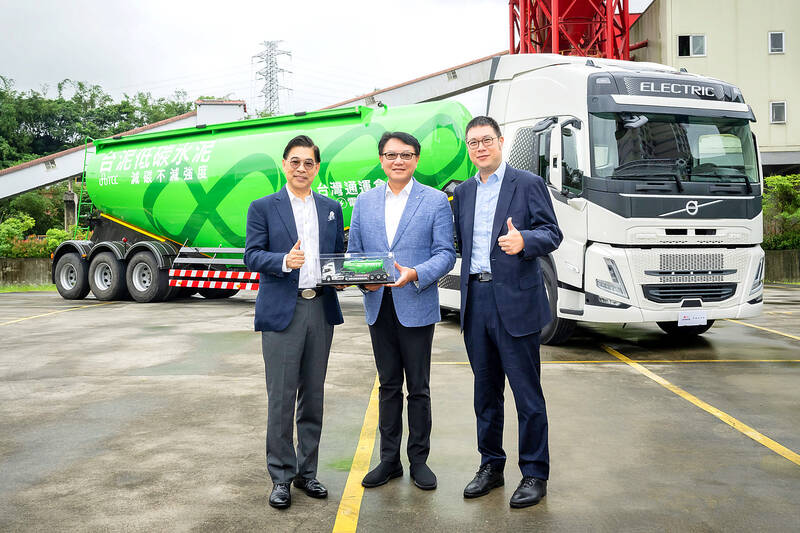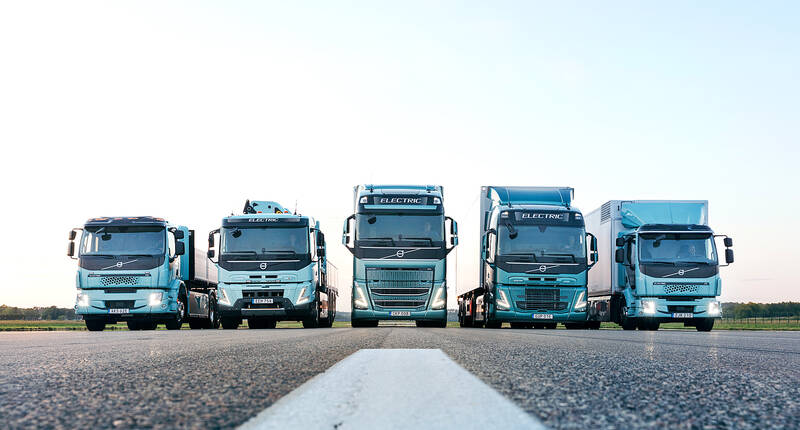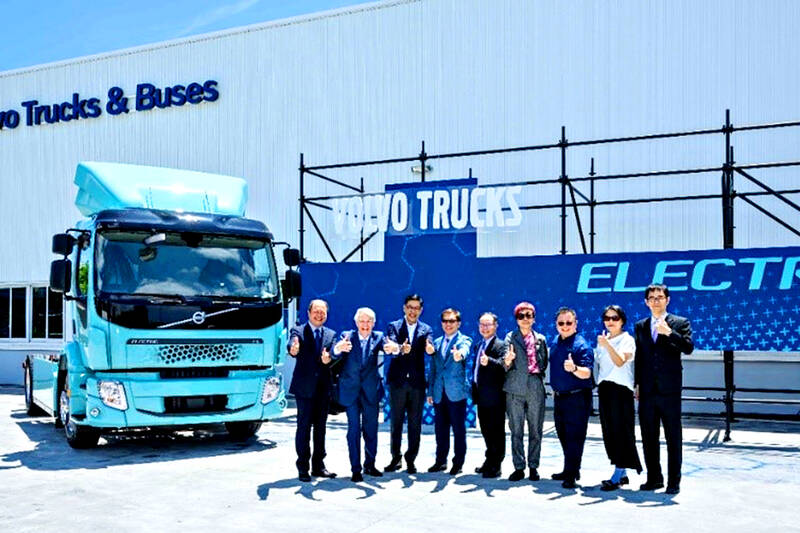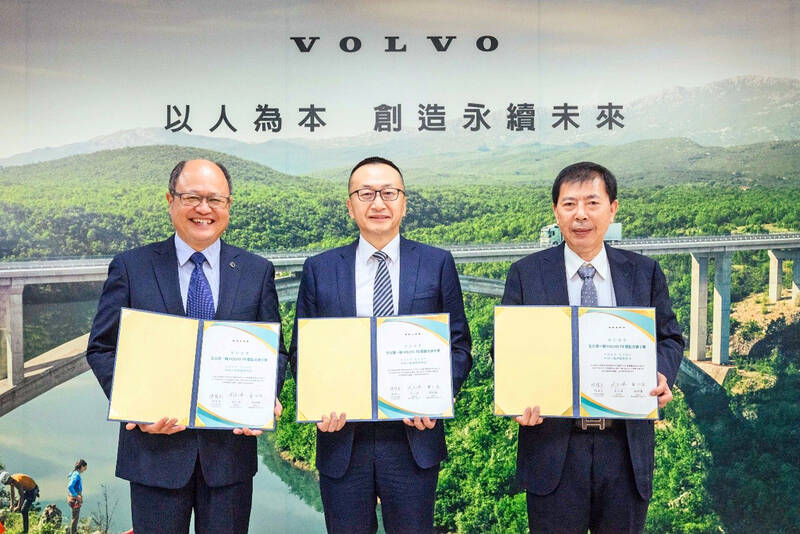Taiwan Cement Corp leads low-carbon revolution with Volvo electric trucks: Driving toward a greener future
Taiwan Transport and Storage Corp (台灣通運倉儲) purchased the first Volvo electric truck, an FME 43-tonne tractor, and held a delivery ceremony for the “Launch of Low Carbon EV Green Transportation” yesterday, making Taiwan Cement Corp (台灣水泥) the first company in Taiwan to adopt electric trucks to transport cement products and demonstrating its commitment to sustainable operations. Volvo electric trucks have great advantages in high-efficiency power, low emissions and ultra-quietness, and can satisfy the company’s sustainability goals.
Taiwan Transport and Storage Corp is to arrange for the two Volvo electric tractors to deliver bulk low-carbon cement. Combined with Taiwan Cement Corp’s green environmental engineering concept, carbon reduction and sustainability effects would achieve rapid growth.

After the successful delivery ceremony with Taiwan Transport and Storage Corp, Volvo Trucks will continue its efforts to promote green energy transportation in Taiwan.
Volvo Trucks’ electric trucks set sights on the world, laying the foundation for global sustainable transportation
As the UN released the Paris Climate Change Agreement, many countries have also made commitments and set goals for carbon reduction.

Facing the challenge of global climate change, Volvo Trucks has launched full range of low-emissions, low-noise level and environmentally-friendly electric trucks.
Since 2019, Volvo Trucks has successively launched 18.5 and 26-tonne FL Electric and FE electric trucks. Last year, Volvo officially commenced mass production of heavy-duty trucks, including tractors and rigid up to 43 tonnes, to meet various business applications for customers.
In recent years, Volvo Trucks has expanded worldwide, starting from Europe and North America, where nearly 6,000 electric trucks are sold in 42 countries around the world, and it continues to lead the market. Important economic centers in Asia, including Singapore, Taiwan, Hong Kong, Japan and Thailand are seeing growing demand for sustainable transportation.

With the introduction of next-generation batteries redefining industrial standards, the battery capacity has been increased by 42 percent. The DC charging technology can quickly recharge the capacity to 80 percent in 90 minutes and complete the charging process in less than two hours.
Volvo Trucks has also set clear goals for the brand. By 2030, carbon dioxide emissions from sold trucks shall be reduced by 50 percent, and by 2040, it shall be reduced by 100 percent. By 2050, Volvo Trucks population shall emit net-zero carbon dioxide emissions.
Taikoo introduces the full series of Volvo electric trucks to provide comprehensive transportation solutions

Taikoo Motors Group (太古汽車集團) has always supported and implemented the plans set by the Volvo brand. In 2023, the brand’s full series of electric vehicles, ranging from 18.5 to 43-tonne trucks and tractors, was introduced. In 2024, it would expand the product line again and introduce electric cement mixer trucks.
Taikoo also provides short, mid and long-term total solutions for EV transportation by building charging stations at its service centers across Taiwan and providing a professional service team to provide full after-sales support of electric vehicles.
Taikoo Motors is to continue to develop a comprehensive 360-degree sustainable ecosystem, collaborating with more strategic partners such as charging stations, energy storage equipment, insurance companies, and more. This aims to facilitate a smoother transition for customers from diesel truck to electric.
Cross-industry practice of ESG Volvo Trucks as the best partner to achieve net zero
Volvo’s electric trucks are now present in more than 40 countries, garnering support from renowned companies across various industries in Taiwan.
WRC Pacific, Ltd, a global leader in environmental protection, has acquired the first Volvo FE electric truck. Additionally, Zuellig Pharma, one of Asia’s largest healthcare service providers, has collaborated with Longfeng Pharmaceutical Logistics to introduce Taiwan’s first Volvo FE electric cold chain truck.
This initiative marks a significant step towards green logistics, showcasing the companies’ dedication to sustainable transportation. Recognized for their leadership in their respective fields, these companies are committed to achieving energy conservation and carbon reduction.
Volvo Trucks continues to lead in electric truck technology globally, advancing green energy and carbon reduction efforts. It remains a committed partner in supporting companies’ endeavors to implement environmental, social and governance strategies.

CHIP RACE: Three years of overbroad export controls drove foreign competitors to pursue their own AI chips, and ‘cost US taxpayers billions of dollars,’ Nvidia said China has figured out the US strategy for allowing it to buy Nvidia Corp’s H200s and is rejecting the artificial intelligence (AI) chip in favor of domestically developed semiconductors, White House AI adviser David Sacks said, citing news reports. US President Donald Trump on Monday said that he would allow shipments of Nvidia’s H200 chips to China, part of an administration effort backed by Sacks to challenge Chinese tech champions such as Huawei Technologies Co (華為) by bringing US competition to their home market. On Friday, Sacks signaled that he was uncertain about whether that approach would work. “They’re rejecting our chips,” Sacks

NATIONAL SECURITY: Intel’s testing of ACM tools despite US government control ‘highlights egregious gaps in US technology protection policies,’ a former official said Chipmaker Intel Corp has tested chipmaking tools this year from a toolmaker with deep roots in China and two overseas units that were targeted by US sanctions, according to two sources with direct knowledge of the matter. Intel, which fended off calls for its CEO’s resignation from US President Donald Trump in August over his alleged ties to China, got the tools from ACM Research Inc, a Fremont, California-based producer of chipmaking equipment. Two of ACM’s units, based in Shanghai and South Korea, were among a number of firms barred last year from receiving US technology over claims they have

It is challenging to build infrastructure in much of Europe. Constrained budgets and polarized politics tend to undermine long-term projects, forcing officials to react to emergencies rather than plan for the future. Not in Austria. Today, the country is to officially open its Koralmbahn tunnel, the 5.9 billion euro (US$6.9 billion) centerpiece of a groundbreaking new railway that will eventually run from Poland’s Baltic coast to the Adriatic Sea, transforming travel within Austria and positioning the Alpine nation at the forefront of logistics in Europe. “It is Austria’s biggest socio-economic experiment in over a century,” said Eric Kirschner, an economist at Graz-based Joanneum

OPTION: Uber said it could provide higher pay for batch trips, if incentives for batching is not removed entirely, as the latter would force it to pass on the costs to consumers Uber Technologies Inc yesterday warned that proposed restrictions on batching orders and minimum wages could prompt a NT$20 delivery fee increase in Taiwan, as lower efficiency would drive up costs. Uber CEO Dara Khosrowshahi made the remarks yesterday during his visit to Taiwan. He is on a multileg trip to the region, which includes stops in South Korea and Japan. His visit coincided the release last month of the Ministry of Labor’s draft bill on the delivery sector, which aims to safeguard delivery workers’ rights and improve their welfare. The ministry set the minimum pay for local food delivery drivers at